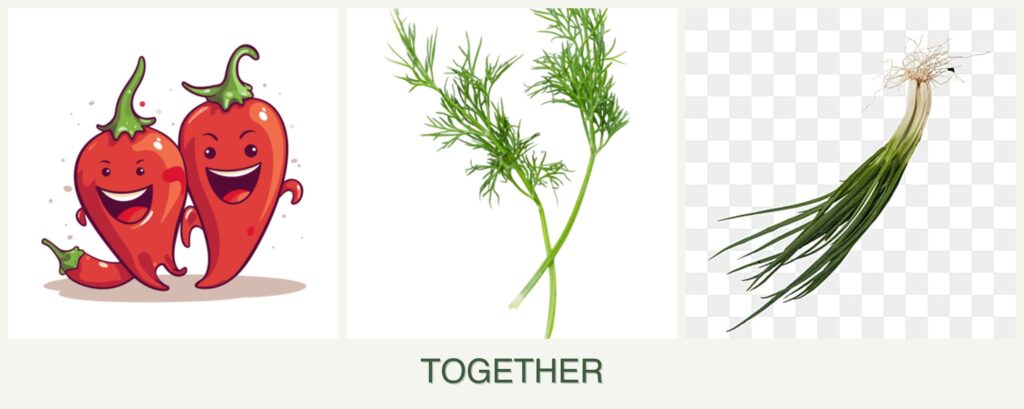
Can you plant peppers, dill and chives together?
Can You Plant Peppers, Dill, and Chives Together?
Companion planting is a popular gardening technique where certain plants are grown together to enhance growth, deter pests, and improve flavor. In this article, we explore whether peppers, dill, and chives can be planted together, analyzing their compatibility and offering practical gardening tips.
Compatibility Analysis
Can you plant peppers, dill, and chives together? Yes, these plants can be grown together, but with some considerations. Peppers, dill, and chives can be compatible companions due to their complementary growth habits and pest-repelling properties. Peppers thrive in warm conditions, while dill is known for attracting beneficial insects like ladybugs that can help control aphid populations—a common pest for peppers. Chives, with their onion-like aroma, can deter pests that might otherwise target peppers.
Key Factors:
- Growth Requirements: Peppers require full sun, while dill and chives can tolerate partial shade. All three need well-drained soil.
- Pest Control: Dill attracts beneficial insects, and chives repel aphids, making them good companions for peppers.
- Nutrient Needs: All three plants benefit from nitrogen-rich soil, but it’s important to ensure they don’t compete excessively for nutrients.
- Spacing: Adequate spacing is crucial to prevent overcrowding and ensure each plant receives sufficient sunlight and air circulation.
Growing Requirements Comparison Table
| Plant | Sunlight Needs | Water Requirements | Soil pH | Hardiness Zones | Spacing | Growth Habit |
|---|---|---|---|---|---|---|
| Peppers | Full sun | Moderate | 6.0-6.8 | 9-11 | 18-24 in | Upright |
| Dill | Full sun/Partial shade | Moderate | 5.5-6.5 | 3-11 | 12-15 in | Tall, feathery |
| Chives | Full sun/Partial shade | Moderate | 6.0-7.0 | 3-9 | 8-12 in | Clumping |
Benefits of Planting Together
Planting peppers, dill, and chives together offers several benefits:
- Pest Repellent Properties: Chives help deter aphids, while dill attracts beneficial insects that prey on pests, protecting peppers.
- Improved Growth and Flavor: Dill can enhance the flavor of peppers, while chives can improve overall plant health.
- Space Efficiency: These plants have different growth habits, allowing for efficient use of garden space.
- Soil Health Benefits: Chives can improve soil structure and deter harmful nematodes.
Potential Challenges
While these plants can be grown together, there are potential challenges to consider:
- Competition for Resources: Ensure adequate spacing to prevent competition for sunlight and nutrients.
- Different Watering Needs: While all three plants require moderate watering, peppers may need more frequent irrigation in hot climates.
- Disease Susceptibility: Overcrowding can lead to increased humidity and disease risk.
- Harvesting Considerations: Dill can grow tall and may shade peppers if not pruned regularly.
Solutions:
- Use raised beds or containers to manage spacing and soil quality.
- Implement drip irrigation to ensure consistent watering.
- Regularly prune dill to prevent shading.
Planting Tips & Best Practices
- Optimal Spacing: Plant peppers 18-24 inches apart, dill 12-15 inches, and chives 8-12 inches.
- Timing: Plant after the last frost when the soil is warm.
- Container vs. Garden Bed: Use containers for better control over soil and spacing, or garden beds for larger spaces.
- Soil Preparation: Enrich soil with compost to provide necessary nutrients.
- Additional Companions: Basil and marigolds can also be planted with these for added pest control.
FAQ Section
-
Can you plant peppers and dill in the same pot?
- Yes, but ensure the pot is large enough for both plants to have adequate space.
-
How far apart should peppers and chives be planted?
- Peppers should be 18-24 inches apart, while chives need 8-12 inches.
-
Do peppers and dill need the same amount of water?
- Both need moderate watering, but peppers may require more frequent watering in hot conditions.
-
What should not be planted with peppers, dill, and chives?
- Avoid planting fennel with dill, as they can compete and inhibit each other’s growth.
-
Will dill affect the taste of peppers?
- Dill can enhance the flavor of peppers, particularly when grown nearby.
-
When is the best time to plant these together?
- Plant them after the last frost date in your area, when soil temperatures are consistently warm.
By understanding the compatibility and growing requirements of peppers, dill, and chives, you can successfully incorporate them into your garden for a thriving and productive growing season.



Leave a Reply